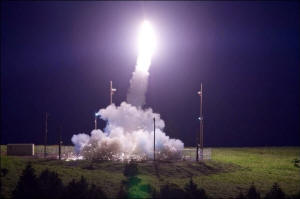|
China should be neutral if North Korea
fires first on U.S.: Global Times
 Send a link to a friend
Send a link to a friend
 [August 11, 2017]
By Ben Blanchard and James Oliphant [August 11, 2017]
By Ben Blanchard and James Oliphant
BEIJING/BEDMINSTER, New Jersey (Reuters) -
China should remain neutral if North Korea launches an attack that
threatens the United States, a Chinese state-run newspaper said on
Friday, sounding a warning for Pyongyang over its plans to fire missiles
near the U.S. Pacific territory of Guam.
The comments from the influential Global Times came after U.S. President
Donald Trump stepped up his rhetoric against North Korea again on
Thursday, saying his earlier threat to unleash "fire and fury" on
Pyongyang if it launched an attack may not have been tough enough.
Asian equity markets sank again on Friday and European stocks looked set
for their worst week this year because of the tensions.
"This situation is beginning to develop into this generation's Cuban
Missile crisis moment," ING's chief Asia economist Robert Carnell said
in a research note. "While the U.S. president insists on ramping up the
war of words, there is a decreasing chance of any diplomatic solution."

China, North Korea's most important ally and trading partner, has
reiterated calls for calm during the current crisis. Beijing has
expressed frustration with both Pyongyang's repeated nuclear and missile
tests and with behavior from South Korea and the United States, such as
military drills, that it sees as escalating tensions.
"China should also make clear that if North Korea launches missiles that
threaten U.S. soil first and the U.S. retaliates, China will stay
neutral," the Global Times, which is widely read but does not represent
government policy, said in an editorial.
"If the U.S. and South Korea carry out strikes and try to overthrow the
North Korean regime and change the political pattern of the Korean
Peninsula, China will prevent them from doing so," it said.
China's Foreign Ministry reiterated a call for all parties to speak and
act cautiously and do more to ease the situation, rather than going down
the "old path" of exchanges of shows of force and continually rising
tension.
North Korea's state-run KCNA news agency said on Thursday its army would
complete plans in mid-August to fire four intermediate-range missiles
over Japan to land near Guam.
Trump said North Korean leader Kim Jong Un was not going to get away
with his "horrific" comments and disrespecting America.
"Let's see what he does with Guam. He does something in Guam, it will be
an event the likes of which nobody's seen before, what will happen in
North Korea," Trump told reporters in New Jersey, without offering
specifics.

Shortly after Trump spoke, U.S. Defense Secretary James Mattis told
reporters the United States still preferred a diplomatic approach to the
North Korean threat and that a war would be "catastrophic".
Asked if the United States was ready if North Korea made a hostile act,
he said: "We are ready."
DRILLS AS TENSIONS RISE
Tension in the region has risen since the reclusive North staged two
nuclear bomb tests last year and launched two intercontinental ballistic
missile tests in July in defiance of world powers. Trump has said he
would not allow Pyongyang to develop a nuclear weapon capable of hitting
the United States.
[to top of second column] |

A Terminal High Altitude Area Defense (THAAD) interceptor is
launched from the Pacific Spaceport Complex Alaska during Flight
Test THAAD (FTT)-18 in Kodiak, Alaska, July 11, 2017. Leah
Garton/Missile Defense Agency/Handout via REUTERS

The threat from Pyongyang is prompting South Korea to beef up its
military muscle amid fears of a clash along the world's most
militarized border, its frontier with the North. Seoul is looking at
building more powerful missiles and a nuclear-powered submarine,
officials said.
The United States and South Korea remain technically still at war
with North Korea after the 1950-53 Korean conflict ended with a
truce, not a peace treaty.
Experts said that, if North Korea did launch intermediate-range
missiles toward Guam, all its other missiles and artillery would be
ready for action. "We should be prepared too," said Kim Dong-yub, a
military expert at Kyungnam University's Institute of Far Eastern
Studies in Seoul.
Japan is also building up missile defenses and is considering the
acquisition of munitions that would allow it to strike at North
Korean missile sites.
On Thursday, U.S. and Japanese troops began an 18-day live fire
exercise on the northern Japanese island of Hokkaido, which was to
include rocket artillery drills and involve 3,500 troops.
The Northern Viper drills are one of the scheduled exercises that
Japan's Self Defence Forces conducts regularly with their U.S.
counterparts and are not a response to the latest tensions.
South Korean and U.S. troops are also gearing up for an annual joint
drill from Aug. 21, called the Ulchi Freedom Guardian, in which up
to 30,000 U.S. troops will take part.

South Korea's national security adviser Chung Eui-yong and his U.S.
counterpart H.R. McMaster spoke on the phone for 40 minutes early on
Friday, a spokesman for the presidential Blue House in Seoul said.
The two discussed responses to North Korean provocations and the
security situation on the Korean peninsula, he said.
On Guam, a tropical island more than 3,000 km (2,000 miles) to the
southeast of North Korea, residents remained sanguine.
"We're just gonna sit down and barbecue here and have fun," said
Peter Toves, 47, a Guam native who rents out kayaks and jetskis.
"There's nothing we can do, just wait."
(Additional reporting by Tim Kelly in TOKYO, Christine Kim in SEOUL,
Martin Petty in GUAM, Kim Coghill in SINGAPORE; Writing by Lincoln
Feast and Raju Gopalakrishnan; Editing by Paul Tait and Clarence
Fernandez)
[© 2017 Thomson Reuters. All rights
reserved.]
Copyright 2017 Reuters. All rights reserved. This material may not be published,
broadcast, rewritten or redistributed.
 |